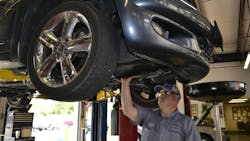Culture in a work environment doesn’t come from the top. It is not created in a “work sesh,” where a carefully curated sentence or two forms a mission statement and a vision comes down from on high by the owner with a pithy view of the business. It just doesn’t. Those things guide a culture. They organize and streamline the efforts of the frontline employees into something productive that the surrounding five-to-50-mile radius of customers and clients are drawn towards.
The culture of a tire dealership is always organic. It’s never AstroTurf lab-created. The systems and beliefs of the employees who do the work are the ones who dictate the culture. The faces, voices and demeanor of the individuals representing the company on a daily basis are the company’s culture.
Sure, charity work, mission statements and a corporate face are important, regardless of if the corporate office is made up of 200 people or two. But what customers experience and more importantly, what they feel with every experience — is what will define your culture.
No amount of little league baseball sponsorships or church bulletin advertising will overcome the feeling by a customer that the person on the other side of the sales counter is about to have a nervous breakdown or the unsettling feeling when a grumpy mechanic swears and slams tools loud enough to get through the double glass door sound-barrier.
Everybody makes mistakes. Everybody has bad days. Not everyone apologizes for them. Some make excuses for a bad experience. Some don’t even notice. Culture permeates through the process from key exchange to key exchange.
You don’t train culture. Heck, some tire dealership owners can’t even recite their own mission/vision — or if they run a really small shop, simply explain why it repairs cars.
Culture permeates the fabric of how things get done. This is why woodpeckers within your business are so damaging, as I have written before. A customer who feels an employee was indifferent towards them or worse is unlikely to return. Mission statements may say, “The customer is everything to us” — but if your culture speaks to profit above all — or service advisors who are indifferent and lack empathy are not only tolerated but hold store titles like assistant manager — then the culture speaks for itself.
The secret? There is no secret. Culture speaks louder than a 50-foot billboard on the highway. Culture is discussed at dinner tables and around cubicles. Feelings are shared. Sure, properly repairing vehicles and selling tires are important. Those are the basic-entry-level-cost-of-doing-business items. You’ll hear a complaint from a customer if their brakes squeak or the engine light comes back on. You won’t hear that your culture stinks.
Culture is also how you make a profit. It is your ultimate proof to customers about why they should choose you over the competition. It’s the consistency of your process, your follow- through on promises, your honesty of when things go wrong and how you’re going to make it right. Culture is not overpromising and underdelivering. It’s standing behind your estimate with the belief that it’s priced properly and will correct the problem properly. It’s trust that the vehicle inspection was thorough and accurate and if the problem has 20 thorns to it, each one will be explained to match the level of the customer’s experience, knowledge and understanding. Trust — not marketing — builds repair orders.
Culture grows from the bottom up and front-line employees are the direct reflection of management’s priorities. It’s genuine team building and influence of — and by — peers. Culture is fed by the sunlight of management. If the only message front-line employees ever hear from above is about productivity and quotas, then the culture will become driven by that message.
You get the result you feed. When customer satisfaction is simply asking for surveys or only comes to the forefront when there is a complaint, front-line employees take notice.
We are entering a phase in retail that’s a paradigm shift from the old ways. It’s not just the technology that’s changing, be it vehicles or kiosks or adaptive robots answering the phone. The more socially disconnected people are from each other, the stronger the pull comes from the places that excel in not just providing a great customer experience, but creating the lasting feeling that lingers in between those events of oil changes and tire replacements.
A fully automated, technology-driven tire replacement experience is likely in the future. It will at least be attempted, that’s for sure. When that happens, pricing structure will immediately become a commodity.
A place I can call and transfer my worry, my fear and my concern to a person who will understand and sympathize with me and will work with my schedule and let me speak about things predictably and honestly? That’s culture. That’s trust. That’s home-grown. And that’s what you want to create at your dealership.
About the Author

Dennis McCarron
Dennis McCarron is a partner at Cardinal Brokers Inc., one of the leading brokers in the tire and automotive industry (www.cardinalbrokers.com.) To contact McCarron, email him at [email protected].
